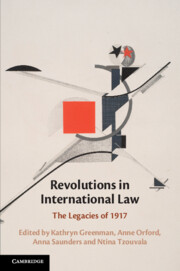Book contents
- Revolutions in International Law
- Revolutions in International Law
- Copyright page
- Contents
- Notes on Contributors
- Acknowledgements
- 1 International Law and Revolution
- Part I Imperialism
- Part II Institutions and Orders
- Part III Intervention
- Part IV Investment
- 11 1917
- 12 1917 and Its Implications for the Law of Expropriation
- 13 Contestations over Legal Authority
- 14 The Mexican Revolution
- Part V Rights
- Index
12 - 1917 and Its Implications for the Law of Expropriation
from Part IV - Investment
Published online by Cambridge University Press: 21 January 2021
- Revolutions in International Law
- Revolutions in International Law
- Copyright page
- Contents
- Notes on Contributors
- Acknowledgements
- 1 International Law and Revolution
- Part I Imperialism
- Part II Institutions and Orders
- Part III Intervention
- Part IV Investment
- 11 1917
- 12 1917 and Its Implications for the Law of Expropriation
- 13 Contestations over Legal Authority
- 14 The Mexican Revolution
- Part V Rights
- Index
Summary
In this chapter I examine three specific legal interventions which flowed from the revolutionary events of 1917 in relation to the law of expropriation. These legal interventions, and the doctrines and principles that they engendered, still hold significance in investor-state arbitration as they are systematically referred to in legal reasoning presented by counsel and continue to shape and influence the decisions of international arbitration tribunals. In light of the analysis carried out in this chapter, it is possible to articulate two main arguments. The first argument relates to the claim, often put forward by international investment law proponents,1 that international investment law and investment treaty arbitration are crucial to the depoliticisation of disputes between investors and host states. According to this view, the international investment law system is capable of ‘avoiding espousal of investors’ interests by their home states’, mainly by directly excluding recourse to diplomatic protection to solve conflicts arising between host states and foreign investors.2 Depoliticisation, within this view, is understood as the transfer of such conflicts ‘from the political arena of diplomatic protection to a judicial forum with objective, previously agreed standards and a pre-formulated dispute settlement process’.3 This view also acknowledges, however, that the disputes decided upon by international investment tribunals indeed remain political in nature for both host and home states.
- Type
- Chapter
- Information
- Revolutions in International LawThe Legacies of 1917, pp. 291 - 314Publisher: Cambridge University PressPrint publication year: 2021

